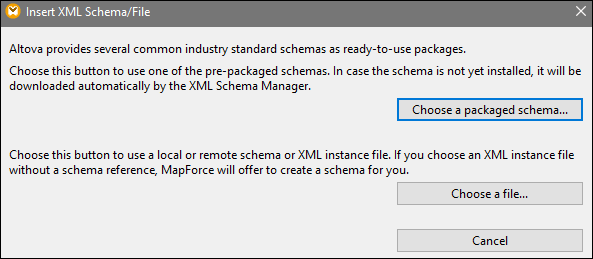XML and XML Schema
Altova website:  XML Mapping
XML Mapping
XML is a markup language for text documents. XML Schema defines the structure and constraints of XML documents. In MapForce, XML files are structural components that can be used as data sources and targets. For information about basic data transformation scenarios, see Tutorials.
Insert XML schema/file
To insert an XML schema/file, select the menu command Insert | XML Schema/File or the  toolbar button. The dialog box (see screenshot below) will prompt you to choose between a packaged industry-standard schema and a local or remote schema/instance file. If you choose a packaged schema, you will be prompted to select an entry point. If the schema you wish to use is not yet installed, you will be redirected to the XML Schema Manager to download it.
toolbar button. The dialog box (see screenshot below) will prompt you to choose between a packaged industry-standard schema and a local or remote schema/instance file. If you choose a packaged schema, you will be prompted to select an entry point. If the schema you wish to use is not yet installed, you will be redirected to the XML Schema Manager to download it.

Generate an XML schema
When you add a local or remote XML file without a schema reference, MapForce will suggest generating an XML schema for you. You will then be prompted to select the directory where the generated schema should be saved.
When MapForce generates a schema from an XML file, data types for elements/attributes must be inferred from the XML instance document and may not be exactly what you expect. It is recommended that you check whether the generated schema is an accurate representation of the instance data.
If elements or attributes in more than one namespace are present, MapForce generates a separate XML schema for each distinct namespace; therefore, multiple files may be created on the disk.
DTD as a document structure
Starting with MapForce 2006 SP2, namespace-aware DTDs are supported for source and target components. To make mappings possible, the namespace-URIs are extracted from the DTD xmlns attribute declarations. However, some DTDs contain xmlns* attribute declarations without namespace URIs (e.g., DTDs used by StyleVision). To make such DTDs usable in MapForce, define the xmlns attribute with the namespace URI as follows:
<!ATTLIST fo:root
xmlns:fo CDATA #FIXED 'http://www.w3.org/1999/XSL/Format'
...
>
Note about enumeration values
For nodes whose data types have enumeration facets, you can create a Value-Map that will have all enumeration values pre-filled. This makes it easier to process and map enumeration values. For more information, see Value-Maps.
In this section
The section is organized into the following topics:
•Comments and Processing Instructions
•Wildcards: xs:any/xs:anyAttribute